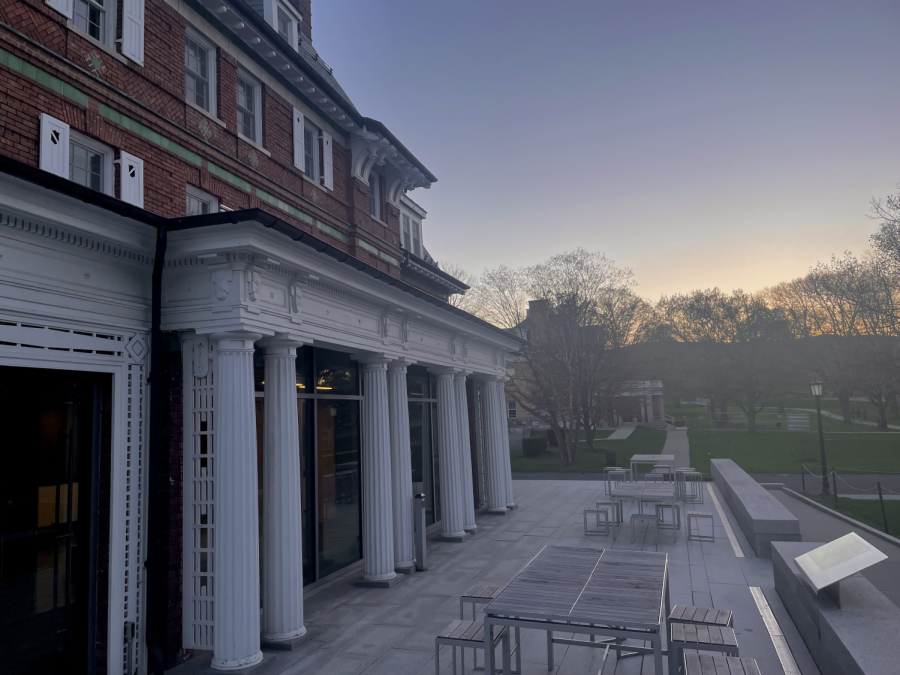‘Years of hard effort’: How the College launched its all-grant financial aid policy
November 30, 2022

On April 13, students awoke to a historic announcement — the College planned to eliminate all loans and work study contributions from financial aid packages.
While the announcement may have come as a surprise to students, the nation’s first all-grant aid program was the result of years of careful planning behind the scenes — along with a last-minute sprint to announce the new policy before summer began.
The idea for an all-grant program was first proposed in 2018 during the College’s strategic planning process, which President Maud S. Mandel launched a few months after assuming the presidency.
One inspiration for the program, according to Chief Communications Officer Jim Reische, was the evolving definition of higher education. Historically, people viewed the undergraduate experience as limited to the on-campus academic year. “Your summers were your own,” Reische said. “There weren’t a lot of study-aways. There certainly weren’t a lot of summer internships.” Now, according to Reische, the definition of higher education has come to extend beyond eight semesters on campus — and the College wanted its financial aid program to expand to match.
The College also viewed an all-grant policy as a way to reach a demographic that had not seen the full benefits of previous financial aid expansions: middle-income families. “There’s a whole band of people in the middle who used to be able to afford college who no longer can on their own,” Reische said. “These policies need to attend to everybody.”
With a general concept for a revitalized aid program in mind, the College turned to practical considerations: securing funding for the plan, restructuring aid packages, and devising how best to deliver the news about the unprecedented change. Working across offices, a team of senior staff crafted a provisional all-grant policy to bring before members of the Board of Trustees, who helped refine the program.
The College also secured funding for the new policy — $6.75 million in 2022–23 — through a combination of alumni support, a draw on the endowment, and other sources. “For the program to be a success moving forward, we hope [the pattern of alum donations] will continue,” Dean of Admission and Student Financial Services Liz Creighton ’01 said.
As the policy neared its final form after years of work, the team informed a trusted student in anticipation of the official announcement. “She burst into tears … because she was proud of Williams and excited about what it meant for her family,” Creighton said. “It was really tangible evidence of how [the policy] might be received.”
On April 8 — after almost four years — the Board of Trustees voted to approve the finalized all-grant program. The timing, according to Reische, was critical. “If the Board had voted on it at their June meeting, then we would have had to announce it in the summer,” he said. Summer announcements tend to receive less media attention, according to Reische, and without April approval, members of the Class of 2026 would have had to make their enrollment decisions without knowing about the policy.
With final approval from the Board, the team set a date to announce the policy: Wednesday, April 13. That deadline gave the College five days to finalize the communication and logistics for the rollout. At the same time, hundreds of prospective members of the Class of 2026 arrived on campus for the College’s first in-person Previews since the pandemic began. “We had this amazing piece of news,” Creighton said. “I think some of us were hoping for an Oprah give – away moment.”
“I remember several funny moments during Previews where families would ask about [campus jobs and debt],” she added, noting that those same families would receive updated financial aid awards only a few days later.
At the time of the Board meeting, the College had admitted 1,048 students to the Class of 2026 via the regular decision process. Because the new financial aid policy was announced partway through the decision window, it was technically possible for students to have declined their offer of admission before hearing about the College’s updated aid policy. But none who declined changed their mind, according to Creighton. “If any student had come back to us after the announcement and said, ‘I changed my mind, I want to enroll at Williams, we would have [allowed them to enroll],” she said.
On the morning of April 13, more than a dozen members of the College’s administration gathered to release the news — and then to celebrate. “People were literally … crying and hugging each other,” Reische said. “That was the culmination of what, for many people, was years and years of hard effort.”








